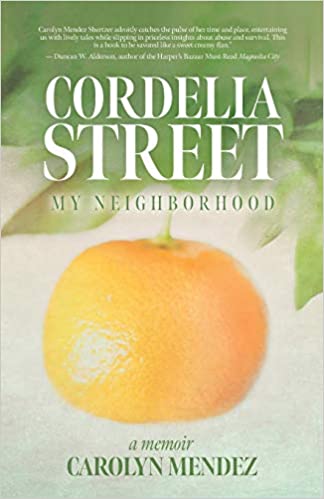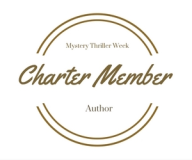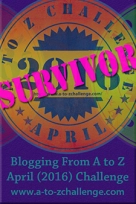Cordelia Street: My Neighborhood
by Carolyn Mendez
It is one of my life’s joys to showcase the great work of a good friend. When I first met Carolyn some years back at the Rabbit Hill Writer’s Studio she had just started drafting Cordelia Street. Some years later after Rabbit Hill closed and we writers were left to fend for ourselves — forming small writing circles to help keep us going — Carolyn and I met up again at a critique group. At that time she had made great strides with the book, but as you will read below, she still wasn’t ready to publish. Carolyn finally retired this year from her decades-long work as a clinical psychologist and with that, she felt empowered to let Cordelia Street loose in the world.
If you are not typically drawn to the memoir genre, it’s time to put your predilections aside because this one reads like a novel. Here’s my review of Cordelia Street:
Out of unendurable pain comes an indelible, incredible memoir by Carolyn Shertzer. In this day of tell-all books full of drama-by-design where each little inconvenience is played out to exponential proportions, it’s surprising to read a book that has not been sensationalized, especially when the underlying facts are nothing short of scandalous. Cordelia Street: My Neighborhood has a thousand secrets and Shertzer reveals them all slowly and methodically in this candid and uncompromising memoir, depicting life-crippling events with such a clear-eyed and steadfast gaze you would think they happened to someone else. Like how her hot-tempered Cuban mafia father almost killed her young, beautiful and gullible mother — his first of nine wives — because she reprimanded him for drinking the juice from the jar of blueberries. Or how her mother’s second husband sexually abused Shertzer for years — while her mother was oblivious to the danger — but also made sure Carolyn read Reader’s Digest religiously because he placed a high premium on education and a good vocabulary. Or how her hard-scrabble and impoverished upbringing as a self-described Florida Cracker was no match for the tight-knit bonds of family and extended community on Cordelia Street. Perhaps it was Shertzer’s decades spent practicing as a clinical psychologist that gave her the ability to process the unspeakable, producing a memoir that reads like a work of fiction. Shertzer owns every one of the events in her story, asking no pity for herself or what she endured, only that we bear witness, not for her, but for all those victims today and forever more who lack her clear voice and the courage to tell their tale. This is a memoir you don’t want to miss.
Let’s spend some time with Carolyn and see what she has to say about the book, her life, and survivor trauma, and set the stage for your next read.
When did the idea to write a memoir first come to you? Was it out of a need to self-analyze or simply to write and process your emotions?
I was always messing with writing, usually poetry, since my early college days. Then I heard about the Literary Guild in Lancaster and started attending a twice-monthly writing workshop. Once I started that, along with the “forced” writing exercises, it all started to flow. Mostly the pieces were about my childhood, and had fun sharing the characters with the group. I had a devastating experience with Tom Larson, a famed memoirist. He came to town to lead a workshop for the Guild about memoir writing, of course. I signed up for a private feedback session with him, and during that meeting he told me in no uncertain terms that I should tear up everything I had written and maybe start over. That, or save the stories for my children to read. He came as close as he could to calling me a failure. Boy, did that hurt. I nearly gave up writing. But my fellow writers at the Guild supported me totally; they were furious with Larson for his feedback. So I kept writing my stories.
Scholastic writing had always been easy for me, but I felt challenged to tap into more personal issues. My persistence usually drove me to try anything new and try my best to become good at it. That applied to skiing, cooking, decorating a house, creating stain glass, and even golfing. I never did master golf, but I enjoyed it enormously.
Where did you find the courage to put all your most secret secrets on the page?
One thing that makes it easier to reveal intimate details of my life, especially my childhood, was that no one is still living who will be hurt or embarrassed by my memoir. They are all deceased. So call me a coward for waiting for this eventuality. I deserve that label. That leaves my children and their spouses. And they are beyond being shocked about their mother—they know I’m “out there.” They want to read my book, and in doing so, I hope they gain insight into their lives via their parenting.
There are details of my abuse that I probably will never fully divulge—they would not further the impact of the memoir, and, as I see it, serve no purpose. I intentionally left out many details that would embarrass me.
I purposely waited until I retired to publish my book, believing that my clients would have difficulty talking to me as a therapist and knowing so much about my personal life. It would have been uncomfortable for me to answer questions or, worse, have them pity me or have a prurient interest.
As a clinical psychologist, you have become a successful professional with a rich and storied history. What lessons or activities — for lack of a better word — from your very difficult childhood have you employed to achieve the goals you have accomplished over the course of your life? How did you choose what to keep and what to leave behind from those years?
In my book, I blurted out to Braulio Alonzo [high school teacher and principal] that I wanted to be a psychiatrist when I grew up, but that did not happen.
As a clinical therapist, I believe I had the ability to focus therapy on my client, not on me. I could absorb their problems or issues without inserting my problems and issues into the process. Occasionally some aspects of my neglect and abuse would allow me to phrase the client’s experience in a way that reflected a genuine understanding of their pain.
Thanks to my training years with Fanita, I possessed the analytical and communication skills to underlie my empathetic ability. Fanita was my supervisor/trainer/mentor for years. Once a month I put myself on a train to study at the Eastern Institute for TA (Transactional Analysis) and Gestalt. Fanita was the founder and director of that institute. I trained with about eight or ten fellow therapists, mostly in groups, with very little individual training. She was amazing! She escaped from the Nazis to come to the U.S. and studied with all the greats: Eric Burn, Fritz Perls, and the like. She and I were quite close — when I completed my Ph.D. she was so proud — took me to lunch and gave me a pair of pearl and diamond earrings. She tragically lost her son and never recovered from that. She moved to California and we lost contact. What a fantastic gift she was — the wise and caring mother I never had.
If we are open, the universe always seems to provide what we need. You needed a mother figure and you got Fatina. Contrast that with the kind of freedom you had growing up to come and go as you pleased, some of which was probably the times you were living in and some because of your particular situation. How did your childhood impact your own parenting style? Did you give your children the same freedoms you had or restrict them knowing the dangers that may always be lurking out in the world? Did you lavish them with things that you may not have had access to as a child?
Parenting is rigged from before the child is ever born. Each birth story is vital to how that child is handled—what in the hell was going on in the two parents’ lives when the baby was conceived? What was going on with each of their parents aside from creating a baby? It goes way back and the facts hardly matter — it’s the mystery of all ages.
I may have been programmed to be a lousy, at least inadequate mother and marry men who carried their own trunk-load of confusing impulses.
The book I’m writing now, What About Him? Revisits Cordelia Street and attempts to unravel some of the issues given inadequate breadth in my memoir. I talk about parenting with Cordelia, King Lear’s daughter, exploring her relationship with her father. I’m writing the story in magical realism.
I’ll be very interested to see where you take that. I keep thinking of the juxtaposition of how your stepfather sexually abused you but also taught you how to read and, by extension, write. How do we reconcile some of the bad things humans do to each other with some of the good that may be a result, and can it ever be made right, especially after the person has died?
This is the toughest question: what does a child do with the multiplicity of human characteristics in herself, her abuser, and other surrounding relationships? Early on, Benny was the scary bad guy and the wannabe authoritarian parent — a problematic combination at best. His alcoholism was so consistent that he was never real, a frightening phantasmagoric figure less than human. It was never the case that he got drunk, abused me once or twice, and then came to his senses. Instead, he perpetually pursued me for years and never showed any remorse or acknowledgment that what he did was wrong. I view him as an incorrigible pedophile who may have married my mother to get at me. Now that I think about it, I spent almost no time with him in a normal relationship. The vast amount of time with him was when he was trying to have sex with me. Am I glad he didn’t rape me? Yes. I’m convinced that he didn’t rape me for reasons I can not understand, probably some version of damage control. I think he just wanted to keep me around to continue doing what he was doing and not ruin it for himself.
As an adult, I never blamed myself for what Benny did to me, always knowing I was never responsible for his actions. Neither did I expect to forgive him for those actions. No doubt forces and experiences in his life contributed to his pathology, but explaining him or understanding him was never my job. Neither do I give him credit for my eventual success academically. Possibly, I could have achieved more in that area had I not been so screwed up emotionally, but I will never know. Do I thank him for teaching me to read? Absolutely not. I would have been a good reader without his help.
The important message in Cordelia Street, I hope, is that I didn’t save myself. Benny certainly didn’t save me, nor did my mother. My neighborhood and those that loved me and looked after me, who gave me safe shelter, saved me.
Perversely, I do not regret keeping my secret for thirty or more years. I regret my failings as a woman and as a mother. Those failings may have been less severe had I revealed my abuse earlier and dealt with it more directly, but I will never parse that. My failings are mine, mine alone. I made choices that I am responsible for; no one, even Benny, gets that put at their feet.
The book stops the year you are 12. How old were you when you were finally able to put all the hurt of your childhood behind you and achieve equilibrium? What were the factors that helped you get there?
Yes, the memoir stops when I am twelve. I was in seventh grade and threatened my abuser with death or exposure, and he went away.
Maybe thirty years later, while participating in a wild encounter group, I decided to make up a song and sing it to the group. I had no idea what I would sing, but I felt ready — ready for what I had not a clue. Unplanned, my song fell out of my mouth: I sang to my little three-year-old-self, letting her talk, letting her tell, or begin to tell her story. All fifty people in my group started crying and moving toward me, and before I knew it, I was in the middle of a huge group hug. All my fear and reticence about speaking of my abuse disappeared, and I never again felt any taboo. That was my second “village.” And I took it to heart.
There is something about that kind of “witness” energy that is so powerful. What a gift to sing your song. What other gifts have you taken from your childhood, both the best and the worst?
I was lucky to have been born when I was and where I was. Cordelia Street: My Neighborhood describes my gifts of grandparents, aunts, uncles, great-grandparents, and neighbors. I hope I gave adequate appreciation to my teachers. From first grade through graduate school, my teachers carried me through. Remembering each one still gives me a smile and a chuckle.
Whenever I am filled with love for my children, my chest swells with the same emotion I had with Charles [you’ll meet Charles when you read Cordelia Street]. What a blessing.
On the flip side, there is no flip side. My identity includes Benny, Grandma Ida, the Blanch, Uncle Lee, and all the rest. They play together quite nicely.
In the constant quest that each one of us has to become the best version of ourselves, how has your childhood hampered or spurred you on to becoming that version? It seems to me to be a walk on the razor’s edge and at any time it can go either way.
Fantastic question. I wish I had a good answer. I’ll make something up.
One aspect of your question is the role adversity plays in shaping character. Whenever a person experiences abuse, neglect, poverty, ill-health, racism, or other types of hardship, he or she responds in a myriad of ways—including defeat, mental anguish, aggression, to name a few. Finding a reasonable and practical reaction to any hardship and trauma requires risk and good decision making. Each time I have responded poorly, I tried to learn from that and not make the same mistake again. When I have responded effectively, I learn from that also. The accumulation of those responses, on either side of the ledger, contributes to growing stronger and wiser.
Helplessness can be real, learned, or imagined. Helplessness is rarely a positive condition or emotion. Most clients entering therapy are feeling helpless in some way—emotionally, financially, medically, relationally. What I have tried to do is empower my clients to think clearly and make good choices. Sometimes I feel like a survivor who knows a little more than the average person about overcoming deprivation, abuse, and other impediments to a healthy life.
There’s a joke among therapists and their supervisors that therapists who had an ideal childhood make lousy therapists. Being happy, well-cared for, having all of one’s needs met are not the best precursors to being a successful therapist.
Carolyn, thanks for joining here today. I applaud your courage in telling your story. I know it will resonate with others who may be similarly situated and hopefully, encourage them to get the kind of help they need. You are a beacon. I wish you all the best with your book launch and eagerly anticipate the prequel.
pam lazos 12.13.20















This sounds like the stuff of a movie, doesn’t it? But so often the most harrowing experiences–and the journey out of that shadowed valley into hope’s light–is more gripping than fiction. Thank you both for this–we need the hope of one soul’s journey in these dark days. xxxxxxx
LikeLiked by 1 person
That we do, Jean since one soul’s journey is all out souls’ journey, right?😘🤩💗
LikeLiked by 1 person
Indeed, Friend, Indeed! xxxxxxxx
LikeLiked by 1 person
🥰
LikeLiked by 1 person
Jean–So delighted that you got my message of hope, aside from the poem at the end. Thanks so much for relating.
Carolyn
LikeLiked by 2 people
Wow is all I can say. What a life and what a book.
LikeLiked by 1 person
It sure is, Michele.🥰
LikeLike
What an interesting book–and interview. Neighborhoods are so challenging. Mostly, we survive them. This sounds like a good read.
LikeLiked by 1 person
👏👏👏
LikeLike
Thank you both for this penetrating interview, both the questions and answers. I confess I was reading it with my heart in my throat. Brutal honesty, thank you. Irrespective of whether one has or not been affected by family dynamics in the way Carolyn has, it will surely be a lesson to anyone reading it, that only honesty and a willingness to not stay repressed or in denial about anything, is the only way to be. Thank you Carolyn and Pam.
LikeLiked by 1 person
And you, too, Susan, would have much to discuss with Carolyn since you share the same profession! Carolyn’s book is so shocking yet because of the honesty with which her story is conveyed there is no sense of pity, and just her strength comes through. It’s really quite amazing, as is she! 🥰
LikeLiked by 1 person
I agree with you, Susan, that Pam’s interview questions were probing as well as insightful. She made my first trip into “authorship” so exciting.
LikeLiked by 3 people
🥰🥰🥰
LikeLiked by 1 person
Thank you, adorable Pam, to let me know another adorable and worthy writer. Your interview opens a lot of interesting issues. 🤗🥰🙏💖
LikeLiked by 1 person
Thank you, Aladin, and yes, it certainly does.
LikeLiked by 2 people
I’m a novice at blogging so forgive the unsteadiness of my response. So here goes–thank you for supporting me and my very dear friend Pam, all at the same time.
LikeLiked by 3 people
🙏❤️
LikeLiked by 2 people
I am glad to know you and highly appreciated.🤗 🙏💖
LikeLiked by 2 people
Oh, where do I start saying how amazing this interview is? How riveting? I don’t know but I can say that Carolyn Mendez is the most incredible person and I’ve had a knot in my throat reading everything she says here.
LikeLiked by 1 person
Aye, you two would have much to say over a glass of wine (for Carolyn) and a pint (for you), Shey, that’s for sure. The stories would be flying. We could have quite the little writing group, I believe. ;0) xo
LikeLiked by 2 people
Heaven, my friend. That would be heaven. xxxxxx
LikeLiked by 1 person
I know, right?!
LikeLike
Shannon–Did I get your name right? Someone is actually reading Cordelia Street that doesn’t know me? Too intoxicating for words. My “baby” is really out there. Thanks for your post. I welcome specific feedback as well, if you’re willing.
LikeLiked by 2 people
Good interview, Pam. When I learn about people who had difficult, troubled childhoods, I realize how very fortunate I am to have been raised by quality parents in a good environment.
LikeLiked by 1 person
And how unusual that is, Neil! 🙏
LikeLiked by 1 person
Neil, can I be jealous of you for that? Just kidding–we get what we get.
LikeLiked by 3 people
What a life! Sounds like a compelling read. Thanks for the review and interview. I’ve added her memoir to my To Read List.
LikeLiked by 1 person
Thank you, dear Rosaliene. 🥰
LikeLiked by 1 person
I enjoyed Mendez’ book and posted a Five-Star review on Barnes & Noble where I purchased her book.
LikeLiked by 1 person
Aw, you are the best, Ros!❤️
LikeLiked by 1 person
Impressive woman! Very patient and wise not to reveal herself until after retirement…
LikeLiked by 1 person
Thanks, Mari.🙏
LikeLike
Yes, Mari, I appreciate your understanding of how important that was for me to wait. Complicated to say the least.
LikeLiked by 2 people